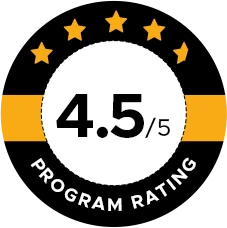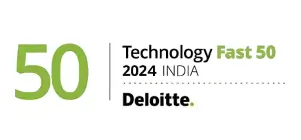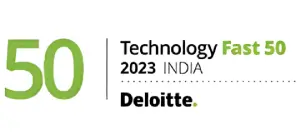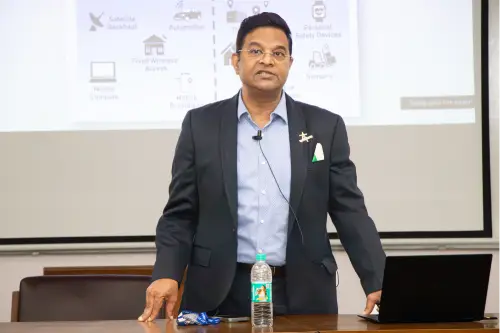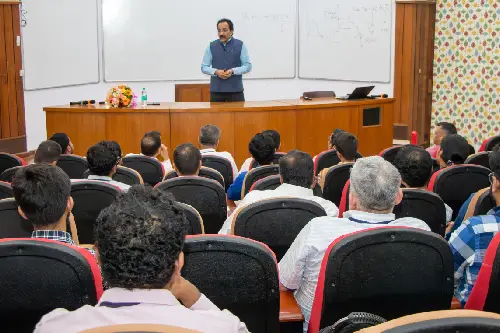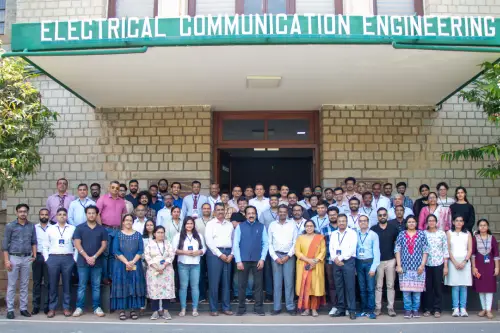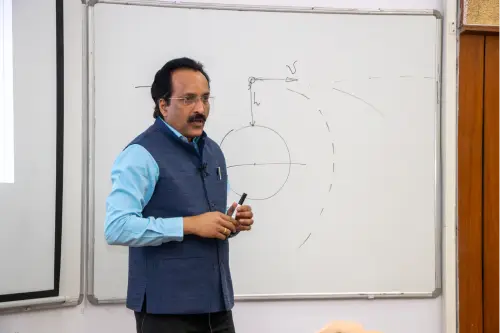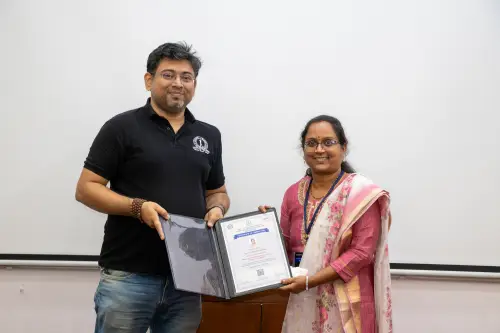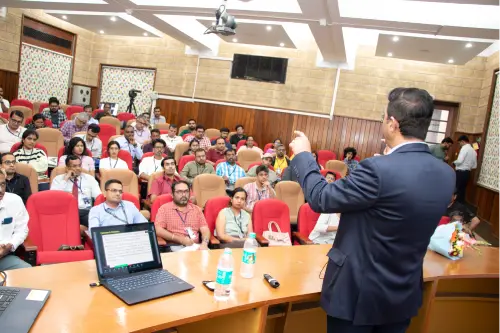- India’s #1Research Institute (2021-24) &
#1 University (2016-24)
NIRF - 6 MonthsExecutive Friendly
Programme - 159 HoursLive Interactive
Sessions - 2Campus Visit
to IISc
Trending Opportunities in
Space Technologies
A fast-growing industry globally, the space sector is predicted to be worth $3 trillion by 2040. Inspired by India's recent space odysseys, the domain has observed renewed interest among space tech aspirants passionate about embarking on cosmic adventures.
The specialised roles include
- Satellite Engineer
- Spacecraft Engineer
- Ground Station Engineer
- Remote Sensing Scientist
- Aerospace Engineer
- Space Data Analyst
- Astrophysicist
- Communication Systems Engineer
- Data Scientist
- Research Scientist
- Space Policy Analyst
- Launch Vehicle Engineer
- Space Robotics
- Aerospace Engineer
- Propulsion Engineer
- And many more
Participant Profile
Experience
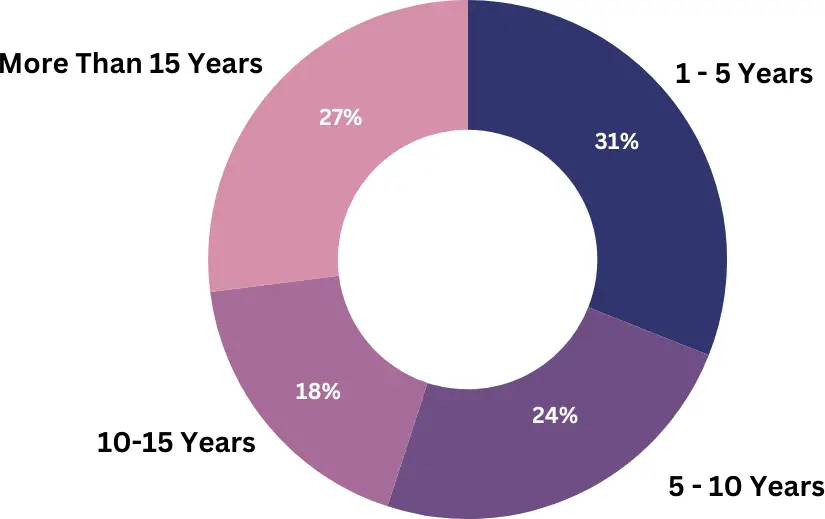
From Top Organizations
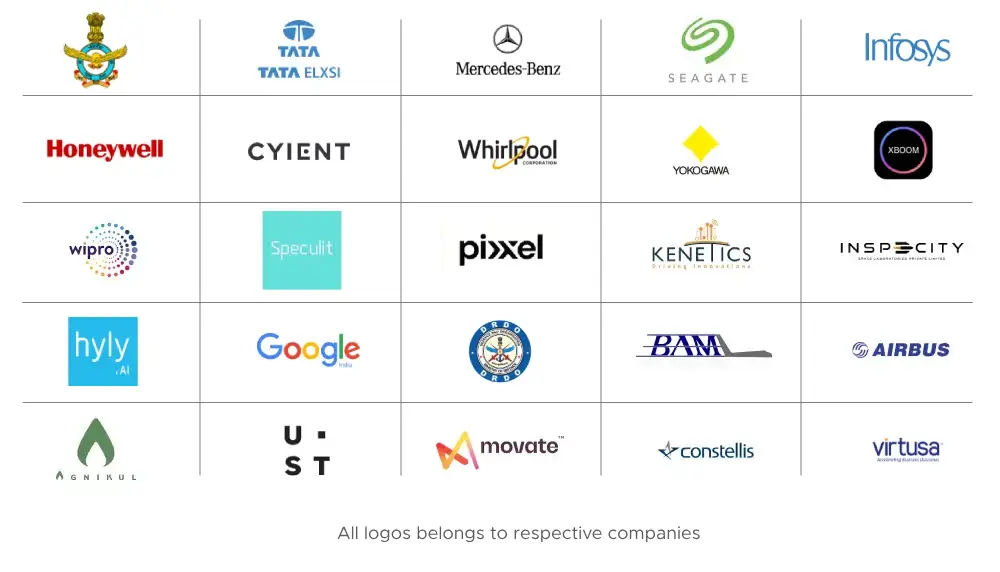
Unlocking Space Tech's Influence
across Industries

The Programme offers 3X Advantage
First of its kindThe only in-depth advanced certificate programme that covers a wide range of modules across Space Manufacturing and technology, Satellite and Navigation Systems, Propulsion and Mission design, among many others.
The Power of twoYou get to learn directly through live interactive sessions from the esteemed IISc faculty members and other Industry experts.
Distinctive Pedagogy159 hours of industry relevant curriculum covers hands-on experience with satellite data sets, case studies, assignments, mini projects and 2 campus visits of 3 days at IISc.
IISc Academic Excellence


The Advanced Certification Programme in Space Technologies is offered by TalentSprint in collaboration with Centre for Continuing Education (CCE) at IISc. CCE-IISc offers courses suitably designed to meet the requirements of various target groups - aspiring research scientists, graduate engineers, and young professionals, enabling them to grow into competent managers of technology-intensive organisations. For more information, visit http://cce.iisc.ac.in
What will I learn?
- Basics of the effect of gravity and other effects of space
- Simulating microgravity
- Simulating other aspects of space
- Lab-on-Chip systems
- Microfluidics and sensors
- Millifluidics
- Biological Payloads
- MANAS as a case study
- Making a microgravity simulator, habitats for space
- MARS case study
- In situ resource utilization (ISRU) for habitats
- Materials and design for space applications
- Case study on MANAS prototype
- Manufacturing technologies (focus on 3D printing)
- System design and manufacturing
- Case studies derived from prior NASA and ESA missions
- Introduction to various thermal management technologies
- Thermal management of orbiting spacecraft
- Thermal network analysis
- Remote Sensing Images: Multi-spectral and Hyper-spectral Images (HSI); Image Restoration
- Image Enhancement: Information Extraction
- Machine Learning (ML) Techniques: Neural Nets and Deep Learning; Convolution Neural Nets
- Dimensionality Reduction and Compression Technique of HSI
- ML applications for hyperspectral image processing
- Fundamentals of AI
- Need for AI: Knowledge representation, perception, reasoning, planning, and scheduling.
- ML overview – supervised/unsupervised learning, clustering and classification, neural networks and deep learning
- Autonomy
- Applications of AI in Space
- Spacecraft health monitoring
- Anomaly and fault detection
- Satellite communication
- Space exploration
- Perception and navigation of autonomous robotic systems
- Case study of autonomous exploration of extraterrestrial environment
Who are the programme mentors?
You will learn from a dynamic IISc faculty members,
all with
academic and research credentials from esteemed educational institutions.
How will I Learn?
A high-impact format perfected for aspirants
- 6-Month Executive friendly programme
- Best in-class Learning Content, Industry Sessions, Quizzes, Mini Projects and Assignments
- 159 hours of immersive learning which includes 135 hours of faculty led live interactive
sessions and 24 hours of campus visits - Participants will have 2 campus visits of 3 days at the Mid and end of the programme.
- Class Start Date - Feb 2026
The programme will be delivered on TalentSprint’s digital platform ipearl.ai
 Hi-Tech Hi-Touch
Hi-Tech Hi-Touch
Hybrid Learning Platform
iPearl.ai (AI-Powered Interactive Platform for Experiential And Remote Learning), TalentSprint’s Digital Delivery Platform, has been architected to incorporate best-of-breed technologies and state-of-the-art components.
The hallmark of the platform is its seamless integration of diverse but related learning technologies that facilitates synchronous learning, asynchronous learning, assignments, assessments, group work, cloud labs, and video indexing, with just one single sign-on. This maximizes user delight, for both students and instructors.
Am I Eligible for this programme?
- The programme is ideal for those eager to leverage their engineering expertise or professional experience to explore new avenues in the emerging space sector.
Eligibility
- Education: B.E/B.Tech in any stream with a minimum of 50% marks
- Experience: Minimum 1 year of professional experience
How do I Enrol in this Programme?
It's a simple 4-step process
- Apply for
Programme - Submit
Details - Await
selection - Join the
Programme
What should I expect from this programme?
- Build expertise in various facets of space technology, including satellite design, manufacturing, navigation systems, and more.
- Acquire industry-relevant capabilities that align with the booming space tech industry, making you a sought-after professional.
- Understand how India fits into the global space landscape, enhancing your ability to contribute to international projects.
- Prepare to be part of India's journey to becoming a space superpower by building the capabilities needed to drive its vision forward.
- Leverage your newly built expertise to tap into opportunities in emerging space tech startups and allied sectors.

TalentSprint Career Accelerator Program
Supports program alumni looking for new Career Advancements
 Professional
Professional
Development
- Resume Building
- LinkedIn Profile Makeover
 Network with
Network with
Peers and Alumni
- Knowledge Exchange Sessions with Business or Tech leaders
- Lifetime Membership to TalentSprint Alumni Network
 Access to
Access to
Career Advancements*
- Job Alerts through TalentSprint Alumni Network
- Support provided from community of industry mentors
*Terms & Conditions apply
What is My Investment?
Application Fee*
₹2,000
Program Fee₹2,16,000
(*18% GST extra as applicable)
![]() Special Program Fee for Corporate Nominations*
Special Program Fee for Corporate Nominations*
**Applicable only for enterprises nominating their employees as a group
Fees paid is non-refundable and non-transferable.
Modes of payment available

Internet Banking
Credit/Debit Card
UPI Payments
Easy Financing Options
Interest-Based Schemes
EMI as low as ₹6,863/Month
Loan Partners
Frequently Asked Questions
The Advanced Certification Programme in Space Technologies is offered by TalentSprint in collaboration with Centre for Continuing Education (CCE) at IISc.
India’s #1 Research Institute (2021-24) & #1 University (2016-24) as per NIRF, IISc, is globally recognized for its academic and research excellence. Home to some of the remarkable achievements and milestones set in the history of science and technology, here are some of the reasons why IISc would benefit you in your career.
- World-class Academia: IISc houses a highly accomplished faculty group of academicians, researchers, and scientists recognised in their respective fields, offering individuals a hands-on and cutting-edge learning environment.
- IISc - ISRO Collaboration: On several occasions, IISc has taken significant steps forward in space exploration through its collaborations and partnerships with leading organizations, particularly with ISRO. It has actively engaged in some groundbreaking research initiatives focusing on areas such as satellite technology, propulsion systems, remote sensing, and satellite communication. The Martian Brick, developing devices to carry out biological experiments in space that could play a vital role in ISRO's ‘Gaganyaan’ Mission, and many more such projects have led to IISc contributing to advancing India's space programme.
- Robust Alumni Network: IISc dons a strong alumni network - academicians, scientists, and industry leaders, many of whom contributed towards the advances of Indian science and technology.
- CCE-IISc: A Certification by the Centre for Continuing Education (CCE) at IISc can open doors to diverse career opportunities in both academia and industry, positively shaping your career path in space technology.
Get CCE-IISc Advantage
- Live sessions by distinguished IISc faculty members
- Get Certified by Centre for Continuing Education (CCE) at IISc
Cutting-edge Applied Learning
- Industry-vetted curriculum with use cases and campus immersion
- Work on real-world projects to build expertise for the space sector
Career Advancement
- Showcase your expertise through projects and experiments
- Upgrade you technical profile with certification from centre for continuing education at IISc
Get TalentSprint Advantage
- Learn on TalentSprint’s patented Digital Platform
- Network with 10000+ TalentSprint Deep Tech Alumni
The programme is ideal for those eager to leverage their engineering expertise or professional experience to explore new avenues in the emerging space sector.
- Build expertise in various facets of space technology, including satellite design, manufacturing, navigation systems, and more.
- Acquire industry-relevant capabilities that align with the booming space tech industry, making you a sought-after professional.
- Understand how India fits into the global space landscape, enhancing your ability to contribute to international projects.
- Prepare to be part of India's journey to becoming a space superpower by building the capabilities needed to drive its vision forward.
- Leverage your newly built expertise to tap into opportunities in emerging space tech startups and allied sectors.
- Space Technology is at the forefront of innovation and has a significant impact on many fields. Space Technology is essential to a broad range of applications in both the commercial and scientific sectors, from communication to earth monitoring, weather forecasting, defence and military applications, planetary exploration and many more.
- The current state of space technology in India has seen remarkable achievements - from the Mars Orbiter Mission, Chandrayaan - 3 and Aditya L1 to deploying nearly 104 satellites in a single flight.
- With more than 190 private players in the Space Industry in India, it is boosting the value chain of the economy. This, in turn, has generated the demand for highly skilled space technology professionals.
- To embrace the innovation and help professionals gear up for this transition, TalentSprint in collaboration with Centre for Continuing Education at IISc, has launched the Advanced Level Certification Programme in Space Technologies.
The programme will be taught by renowned IISc faculty members bearing academic accreditation from top institutions worldwide.
- Education: B.E./B.Tech/M.E./M.Tech/M.Sc degree with a minimum of 50% marks
- Experience: Minimum 1 year of professional experience.
About TalentSprint

- 15 Years of
Excellence - 300K Empowered
Professionals - 95% Completion
Rate - 85 Net Promoter
Score - 30+ Awards &
Accolades
TalentSprint, Part of Accenture is a leader in deeptech education with over 15 years of education excellence, offering AI-powered bootcamps and transformational learning programs for modern professionals aspiring to future-proof their careers with deep expertise. Blending a legacy of impact with Accenture’s global reach, we partner with leading enterprises and top-tier academic institutions to co-create industry-relevant learning experiences that drive high-impact outcomes.
Today as part of Accenture LearnVantage, we play a critical role in helping organizations become talent creators—equipping their people with the skills needed to lead in an era defined by technology, data, and AI. Through strategic upskilling, reskilling, and AI readiness programs, TalentSprint, Part of Accenture is commited to putting people at the center of reinvention. Our end-to-end learning journeys across emerging technologies and next-gen leadership drive measurable business value, long-term capability building, and sustained competitive advantage.
Overview of the programme
India is a rising space superpower, thanks to ISRO's remarkably successful lunar and solar missions. With over 400 private space tech firms, India ranks fifth globally in the number of space companies, creating a thriving ecosystem for engineers passionate about space technology.
The programme enables aspirants with the capabilities to pave a career in the fast-evolving world of space technology. Participants will delve deep into the heart of space tech, gaining invaluable insights into the human-machine interface in space cabin design, the fabrication of biotechnological payloads, emerging manufacturing technologies for space components, hands-on experience with satellite datasets, and much more.
The programme is offered by TalentSprint in collaboration with CCE-IISc. This is a 6-month programme where you will experience immersive learning packed with LIVE interactive sessions, real-world use cases, industry-specific modules, 2 campus visits at IISc, and mini-projects.
Campus Visit
